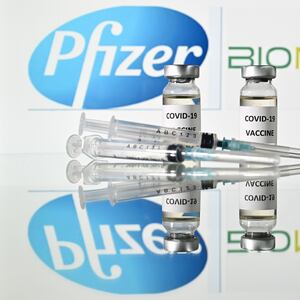When Donald Trump held an unhinged, election-focused event bizarrely trumpeting the massive coronavirus infection rate in the United States on Tuesday, he got one thing right: The hunt for a COVID-19 vaccine is going remarkably well.
A survey of top infectious disease experts in the country—including the chair of the committee responsible for reviewing vaccine candidates—told The Daily Beast that the rapid march toward vaccination against the deadly scourge was a spectacular achievement.
Scientists from the Food and Drug Administration on Tuesday released a set of data analyses on the Pfizer/BioNTech coronavirus vaccine—which was injected into the first non-trial participants in the United Kingdom hours earlier—paving the way for its use in the U.S. The 53-page document said the agency had not found any serious safety concerns and that it provides strong protection against COVID-19 within 10 days of the first dose. The FDA’s advisory panel will discuss the documents on Thursday and then vote on whether to authorize use of the vaccine.
“Speaking as an individual, not as a member of the advisory group, the data look very encouraging,” said Arnold Monto, acting chair of the Vaccines and Related Biological Products Advisory Committee meeting and an epidemiologist at the University of Michigan’s School of Public Health.
“I am happily surprised, and so is everybody else,” added Monto, noting that authorities were at one point discussing the possibility of approving safe vaccines that were proven to be more than 50 percent effective. “And surprise! It’s more than 90 percent effective.”
Dr. Jeffrey Klausner, an adjunct professor of epidemiology at the University of California Los Angeles who previously worked for the Centers for Disease Control and Prevention, said Tuesday that “the vaccine clearly works and is safe.”
“The most common reactions were mild pain at the injection site and fatigue,” Klausner added. “I’ve been pleasantly surprised. The vaccine development and study outcomes are going better than expected.”
And it wasn’t just Pfizer’s drug that looked promising. Another American pharmaceutical company, Moderna, is expected to receive emergency use authorization by the FDA as soon as later this month for its vaccine.
“We haven’t seen the latest data yet, but it appears to be very similar, so we can likely put Moderna in the same class as Pfizer,” said Monto. “We’ve had experience with flu vaccines that are only 60 percent effective, and there was a lot of concern that this would be like the flu vaccine.”
“The take-home message—and this is something I don’t think has been covered enough—is that we are very fortunate that protection seems to be a result of antibodies [targeting] the spike protein of the virus,” he added. “It makes the path to development of the other vaccines much easier.”
In other words, even if there are manufacturing or other issues for Moderna or Pfizer—and there almost certainly will be—other companies can use the same method to create new vaccines.
A new peer-reviewed study in The Lancet on Tuesday suggested the much-discussed vaccine in development by Oxford University and AstraZeneca, which is more durable than the Pfizer and Moderna “MRNA” vaccines—both of which require cold storage—was effective. That could help inoculation reach communities without the infrastructure to store the more sensitive vaccines. But there are still many unanswered questions for that vaccine’s developers to address, experts have said.
Even so, with the two current options that are likely to be authorized, Americans should see death rates, hospitalization, and infection rates fall in the coming months.
“Nearly 80 percent of all deaths due to COVID have been in those over 65,” which is why nursing home residents and healthcare workers are likely to be the first group set to receive an authorized vaccine, Klausner noted. “The main issue now is to get the vaccine deployed. We need a clear national strategy and federal leadership.”
Experts were quick to point out that there are many hurdles between FDA authorization and an end to the pandemic’s turmoil.
“I think they’re likely to work,” said Dr. William Haseltine, an internationally renowned infectious disease expert who was at the heart of the U.S response to the HIV/AIDS and anthrax crises. “But the rollout is going to be slower than people would like.”
Two key problems, in addition to well-documented distribution and manufacturing concerns: We don’t know how long they last, or if they prevent asymptomatic people from infecting others.
Experts were bullish even on those fronts, however.
“In general, anything that inhibits symptomatic infection is going to help in cutting down transmission,” Monto said, who added, referring to vaccines that prevent people from infecting others, “We have never licensed a vaccine based on sterilizing immunity.”
Still, experts were quick to point out that the winter, already marked by surging caseloads and record deaths—both made worse by holiday travel and cold weather pushing people indoors—will be a truly nightmarish one.
“We’re in for a long, hard period,” said Haseltine.
On the road to the spring, there will likely be “tremendous numbers of complications and challenges,” said Dr. Irwin Redlener, founding director of the National Center for Disaster Preparedness and a senior research scholar at Columbia University’s Earth Institute. “Everything from storage and distribution to a very serious and growing movement of vaccine resistance.”
Redlener called the latest developments “good and exciting news that offers the prospect of sooner-rather-than-later control of the pandemic.”
“But by sooner,” he added, “I mean within a year from now, not next month.”








